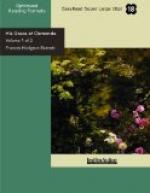and brilliant Court he began life hearing stories
of; before he had reached ten years of age, King Charles
had died and James the Second was ruler of England;
in three years more his Majesty had been deserted by
all and had fled to the protection of Louis of France,
leaving his crown behind him to be offered to and
accepted by William of Orange and Mary, his well-beloved
wife; but four years later Queen Mary had died of
small-pox and left her husband overwhelmed with grief,
crying that he had been the happiest of men and was
now the most miserable. Kings are not made and
deposed, crowned and buried and mourned, without pomps,
ceremonials, and the occurring of events which must
move even the common mind to observation and reflection.
This young mind was of no common mould, it having
come into the world active and by nature ready to
receive impressions, and from its earliest consciousness
had been watched and cultured in such manner as must
have enriched even the poorest understanding.
As children of ordinary rank are familiar with games,
and hear of simple every-day events that happen to
their neighbours, this heir to a dukedom was familiar
with the game of Courts and rulers and heard daily
discussion of Kings and great statesmen—of
their rights and wrongs, their triumphs and failures.
The changing events made such discussion inevitable,
and the boy, being through their wise affection treated
almost as the companion of his parents, heard much
important conversation which filled him with deep interest
and led him into grave thinking which greatly developed
his powers of mind. Among the many memories which
remained with him throughout his life, and which in
his later years he realised, had left a singularly
definite image upon his mind, was this small incident
of his first hearing of the Gloucestershire baronet
whose lady had wept the blue from her eyes in her
wretchedness under his brutal neglect and cruelty.
The impression doubtless owed much of its vividness
to the fact that ’twas made so early as to be
the first realising of the existence of a world where
misery dwelt as a common thing, where men were coarse
and cruel, where women were tyrannised over and treated
roughly, and where children were unloved and neglected.
Into this world he had previously obtained no glimpse;
but, once having realised its existence, he could
not easily forget it. Often as time passed he
found himself haunted by thoughts of the poor injured
lady and her children, and being a creature of strong
imagination, there would rise before him mental pictures
of what a household might be whose master was a coarse
rioter before whom his wife and children cowered in
fear.
So it happened in his conversing with Mistress Halsell he broached the subject of the Gloucestershire baronet, and the good woman, seeing that his speech did not arise from idle curiosity, told him what she knew of this most unhappy family.




